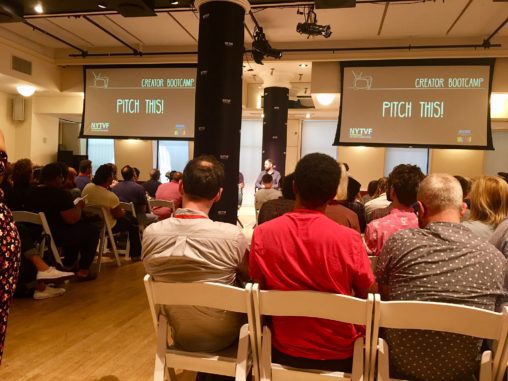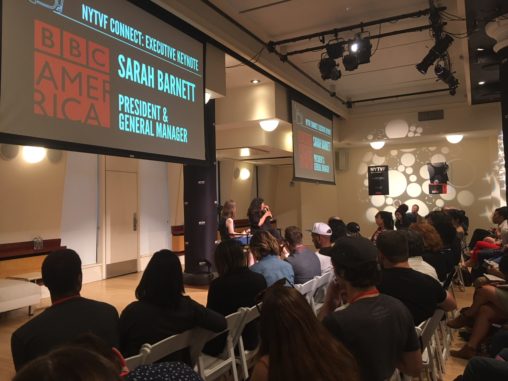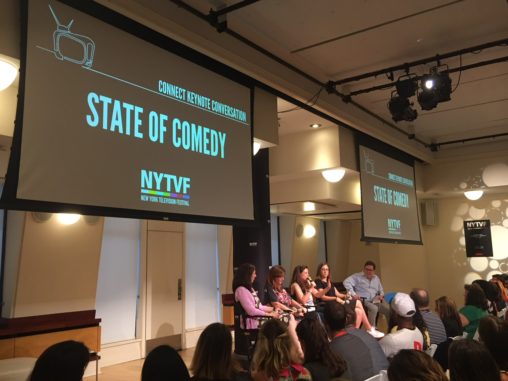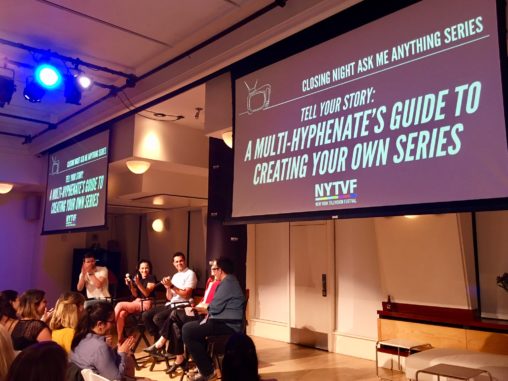
It didn’t take long to broach the subject.
How do I become the next Anthony Bourdain? That’s the question an earnest young attendee asked the panel of experts, revealing her desire to replace the CNN host & celebrity chef who took his own life earlier this year.
The searing answer, delivered during the opening presentation Pitch This! at the NY Television Festival, (NYTVF) was served up as quickly as a flash-fried chicken thigh.
“We’re always looking for unknown talent, but not looking for a new Anthony Bourdain,” was the consensus.
That not so cryptic message resounding throughout the 14th annual NYTVF, based primarily at the Helen Mills Theater and Event Space on W 26th Street. Be yourself, be unique, seemed to be the mantra.
Although the spate of panels didn’t directly address travel programming as such, many of the general tips can easily be applied to this genre of entertainment.
The panelists, a mix of executives from leading networks, studios, agencies and digital platforms as well as showrunners, producers, writers and comedians ran the gamut from outlets such as CBS, NBC, truTV, Comedy Central, Showtime, BBCAmerica and HBO.

So how to pitch a travel program?
Here are the basics:
Passion. It might sound cliché, but the concept never grows old. Your passion for the project has to be palpable. Express clearly why you are the only one to tell this story.
It’s a great time to be floating out a pilot because there’s so many distribution channels these days.
*The key is to target the appropriate marketplace for your inventory
*Decide whether your series will be scripted or unscripted
*Develop a producer’s mentality. Have a vision and think beyond the pilot
*Know your audience and your buyer
*If you are making a sizzle reel, (a 1:30 – 3 minute promo tape that teases the pilot,) or a full-on pilot, don’t skimp on a video editor. It is worth the money to have a polished, snappy piece.
*Practice your pitch in advance by recording it on camera, and strive to be as concise as possible
*The way you pitch an idea should reflect the way you want to write it. Keep the style consistent.

Touch on all the questions that might be posed to you about your pilot, script or sizzle reel.
Among them:
Who are you? Why should I care? What’s your story? Why now?
In essence, make yourself memorable by relating your own personal narrative and focusing on your strengths. In a pitch meeting, listen to what people on the other side of the table are saying.
Accept that it’s okay not to have all the answers. A couple of rote responses to something you might not know include:
“I hadn’t thought about that” or, “I’ll get back to you on that.”
Clearly explain what makes you different and attractive as a partner. People want to work with other awesome people.
Let your idea breathe during the pitch. Get to know the person you are speaking with beyond the pitch.
For instance, if you are given 30 minutes, set aside 10 for candid dialogue at the end and it’s okay to do some self-promotion to wrap things up. “By the way, I have a couple of other quick ideas to run past you.”
Don’t worry if the concept of your pilot isn’t an exact fit. If they like it, the network or production company will likely work with you to help shape it.

Follow up:
Carefully review the feedback from the meeting. Be open to letting your idea evolve. Believe in it enough to reposition and retool it.
Circle back by reaching out with something new to advance the discussion.
Consider attending a TV festival. They are designed as one route to getting a series off the ground. For instance the 14th annual NYTVF was the most successful yet, with a record-breaking 620 development meetings taking place between independent TV creators and industry executives, up from 600 last year.

Getting Past No
In a world where executives hear at least three pitches a day and move forward with just one successful pitch a week, there is plenty of opportunity to take a pass personally. When the answer is almost always a no, (an estimated 85% of pilots fail) here are a few ways to frame the perceived rejection:
*Every no is a building block to the yes
*Think of no as “not yet”
*Be as gracious accepting the no as the yes
*Continue meeting as many people as you can. It’s all part of the process.
*Stick with it
*Don’t give up
Here’s an encouraging perspective. Kathleen McCaffrey, SVP of Programming for HBO says you “just need one executive to believe in you.”

Do It Yourself
Why wait for an executive to give you the green light? Take success into your own hands.
Today, you can easily incubate your project digitally. In other words, “go make your own shit” as I heard one panelist so eloquently state.
The good news is the “way in which people watch TV is changing profoundly,” according to BBC America’s Sarah Barnett.
*Be a multi-hyphenate: a producer-writer-editor-videographer. Learn all the skills you need to make a pilot on the cheap. Several panelists emphasized the importance of tackling editing skills.
*Build a community around your project by developing a footprint in social media
*Facebook has become a very good place to find an audience particularly if you’re older
*Create a podcast
*YouTube can be a tough nut to crack, but you can methodically build an audience through careful promotion.





